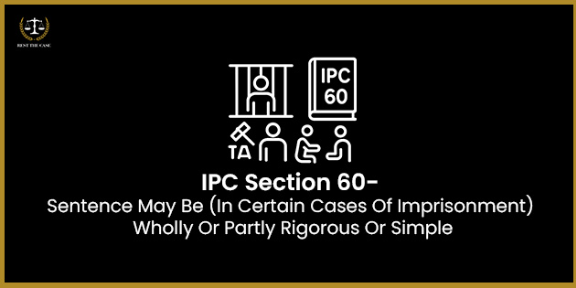IPC
IPC Section 60: Sentence May Be (In Certain Cases of Imprisonment) Wholly or Partly Rigorous or Simple

In India’s criminal justice system, imprisonment is not just about the duration of punishment - it also concerns how that punishment is served. The Indian Penal Code (IPC) Section 60 provides courts with flexibility when deciding the nature of imprisonment. Specifically, this section empowers the judiciary to determine whether the sentence should be rigorous, simple, or a combination of both, depending on the nature of the offence.
Though often overlooked, Section 60 plays a crucial role in individualizing punishment based on circumstances, severity, and intent behind the crime.
What We’ll Explore in This Blog
- The original meaning and legal explanation of IPC Section 60
- The difference between rigorous and simple imprisonment
- Why courts are given this discretionary power
- Practical application and limitations of this provision
- Its relevance in sentencing philosophy in India
- Judicial observations and legal significance
What is IPC Section 60?
Legal Text:
Section 60 of the Indian Penal Code states:
"In every case in which an offender is punishable with imprisonment, which may be of either description, it shall be competent to the Court which sentences such offender to direct that such imprisonment shall be wholly rigorous, or that such imprisonment shall be wholly simple, or that any part of such imprisonment shall be rigorous and the rest simple."
Simplified Explanation:
This provision allows the judge to decide the nature of the imprisonment — whether the convict should serve rigorous imprisonment (with hard labor), simple imprisonment (without labor), or a combination of both, depending on the facts and gravity of the case.
Understanding Rigorous vs Simple Imprisonment
Rigorous Imprisonment:
- Involves hard labor such as stone breaking, carpentry, cleaning, or agricultural work.
- Generally awarded for grave or heinous offences.
- Considered more severe in nature.
Simple Imprisonment:
- No hard labor is involved.
- Reserved for relatively less serious offences such as defamation or public nuisance.
- Focus is on confinement, not punishment through labor.
Purpose and Application of Section 60
The primary objective of Section 60 is to give courts flexibility in sentencing. It ensures that the punishment fits the crime not only in duration but also in nature.
Key Purposes:
- Tailored Sentencing: Allows consideration of mitigating or aggravating factors while awarding punishment.
- Judicial Discretion: Empowers judges to balance justice with compassion.
- Graduated Penalties: Encourages proportionality in sentencing, based on the offender’s conduct, background, and intent.
For instance, a first-time offender who committed a non-violent crime may be sentenced to simple imprisonment, while a repeat offender or someone involved in violent conduct may be sentenced to rigorous imprisonment.
Judicial Observations on Section 60
Indian courts have upheld the importance of discretion under Section 60 to ensure justice is individualized and proportionate.
In various judgments, the courts have observed that sentencing must consider:
- The nature of the crime
- The mental state of the accused
- The circumstances of the offence
- The likelihood of reformation
There is no fixed formula for awarding rigorous or simple imprisonment, and it lies entirely within the court’s discretion, but this discretion must be exercised judiciously.
Why Section 60 Matters in Modern Sentencing
Section 60 is important because:
- It allows the criminal justice system to move away from a one-size-fits-all punishment model.
- It aligns with reformative justice, especially in minor or first-time offences.
- It provides balance between deterrence and rehabilitation, depending on the case.
Unlike colonial-era provisions like Section 59 (transportation), Section 60 remains relevant and progressive in nature. It empowers the judiciary to practice contextual sentencing that fits both the crime and the convict.
Conclusion
IPC Section 60 plays a significant role in personalizing punishment under Indian criminal law. By allowing courts to decide whether imprisonment should be simple, rigorous, or mixed, it ensures that justice is both proportionate and humane. This flexibility supports a justice system that is not merely punitive but also reformative. While duration determines how long the convict will remain behind bars, Section 60 helps decide how they will spend that time, whether in hard labor or simple confinement. As Indian criminal law evolves, such provisions become even more important in upholding the spirit of justice and fairness.
Frequently Asked Questions
Q1. What is the difference between simple and rigorous imprisonment?
Simple imprisonment involves confinement without labor, while rigorous imprisonment includes hard labor such as physical or manual work.
Q2. Can a sentence include both types of imprisonment?
Yes, under IPC Section 60, a court can direct that a sentence be partly rigorous and partly simple, depending on the case.
Q3. Why is judicial discretion important under Section 60?
It helps ensure that sentencing is fair, proportionate, and considers the offender's background, nature of the crime, and chances of reform.
Q4. Is IPC Section 60 still in force?
Yes, section 60 is a valid and actively used provision in Indian criminal jurisprudence.
Q5. Does Section 60 apply to all offences?
No, it applies only to offences where the IPC specifies imprisonment of either description (rigorous or simple). For offences that mandate only one type, Section 60 does not apply.






